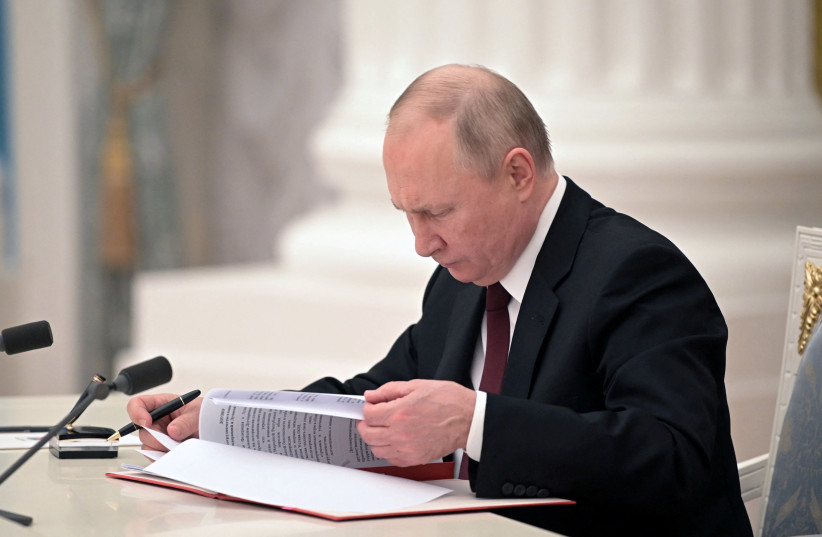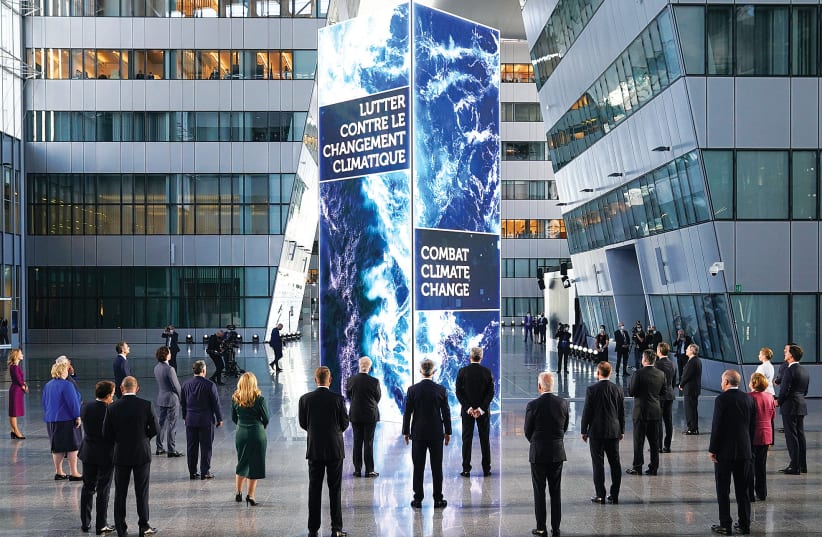Ignorance, the weapon no spy can map and no bunker can hide – is the Ukrainian conflict’s ultimate victor.
Much has been said this week about Vladimir Putin’s version of Ukrainian history, and his dismissal of its right for self-determination.
Many in the West ridiculed Putin’s statement, but ignorance was in fact theirs more than his. Ukraine sure was part of Russia for centuries, and the two indeed are ethnically, religiously and culturally intertwined.
This is besides the fact that many of those who laughed at Putin’s historicism are unequipped to debate a Russian leader’s interpretation of Russian history. In fact, post-Soviet Russia’s imperialism was sparked by a succession of American leaders’ ignorance.
Dazzled by the end-of-history euphoria that followed the USSR’s dissolution, former secretary of state James Baker wrote:


“NATO leaders should draw up a clear road map for expanding the alliance eastward to include the states of Central and Eastern Europe and the former Soviet Union, especially a democratic Russia.” (“Expanding to the East: A New NATO,” Los Angeles Times, December 5, 1993)
Baker’s statement reflected Western impressions that Russia had shrunk into a post-imperial power like France, and Moscow could thus be made to “join” the West, as Baker put it, a euphemism – in the eyes of Russians like Putin – for following the West’s lead.
Had they been less ignorant, Western leaders would realize that Russia, whatever its domestic condition, cannot be sidelined. It remained the world’s largest country, richer than any other in natural resources, and armed to its teeth.
Shimon Peres understood this when he insisted that Russian foreign minister Andrei Kozyrev attend the Oslo Accords’ signing ceremony in 1993. Bill Clinton did not understand this when he tried, and failed, to broker Middle Eastern peace deals in disregard of Russia.
George W. Bush also didn’t understand Russia’s place in the world, and thus responded to the September 11 attacks by invading Afghanistan with NATO, ignoring that theater’s sensitivity, and proximity, to Russia.
The same ignorance made him frame the Islamist attack as an assault on the West, instead of depicting it as an assault on all non-Muslims, as a joint American-Russian response would have made plain.
The same misconception surfaced in spring 2008, when Bush said Georgia and Ukraine should join NATO despite Russian resistance, a statement that made Russia invade its southern neighbor four months on.
Ignorance of Russia’s place in the world climaxed during the Obama presidency, when NATO bombed Libya in disregard of Russia’s veteran role in that land. Had Barack Obama been prepared for Russia’s response – an effective takeover of Syria – it would have been one thing, but Obama’s response to Russia’s response was to flee the scene and abandon Syria to Moscow’s devices.
So yes, American ignorance first sparked Russia’s neo-imperialism, and then failed to nip it in the bud. This doesn’t mean that ignorance surrounding the Ukrainian conflict is exclusively Western.
PUTIN’S UNFAMILIARITY with Western mentality surfaced most strikingly in his lies. Does he really think anyone in the free world believes his charges of Ukrainian “genocide” against Russians? Where is the evidence, basic things like locations, dates, numbers of casualties, and methods of killing?
The same goes for his absurd suggestion that Ukraine is out to attack Russia, or that the West is out to make Ukraine undergo “forced change of identity.” In deploying such fiction while addressing “the West,” Putin displays an utter ignorance of the Western mind.
Even so, and harsh as this willingness to invent facts is, it is less crucial than Putin’s misunderstanding of history, which is on par with, and far worse for Russia, than any American president’s ignorance.
Putin’s historic misconceptions begin with the very term “NATO expansion.”
As he sees things, NATO expanded because “the West” plotted its expansion. That’s not what happened. The pressure came not from above, but from below. In fact, when the USSR collapsed Western leaders were reluctant to admit former rivals into their military alliance.
The ones which drove NATO’s expansion were the defunct Warsaw Pact’s new democracies. It was their newly empowered people’s demand. In Hungary, for instance, there was a referendum on NATO accession in 1997. The idea won an 85% majority.
Was that a Western ploy, as Putin sincerely believes? It wasn’t. It was the people’s will, just like joining NATO was a stated aim of the Hungarian Revolt in 1956.
Beyond that choice lurks the second thing Putin doesn’t understand about history: that Russia’s “allies” hated Russia. Having visited various post-Soviet realms from the Baltics to the Caucasus, this writer has repeatedly encountered this sentiment.
To those people, the Soviet Union is not the romantic memory it is for the man who said its collapse was “a genuine tragedy,” but a trauma of oppression, destitution and murder.
This is evidently difficult for a KGB-graduate to digest, but it is a fundamental fact of the reality he faces, and of the history he is so quixotically out to revive.
The same background leads Putin to his worst misunderstanding of history, the belittlement of economics.
In his Cold Warrior’s reading, atlases are more important than balance sheets. That is why he is investing so much energy in enlarging his people’s borders, and so little in raising their income, which is lower than nearly half the world’s countries.
Had he understood history, Putin would spend less time thinking how to swamp Europe with immigrants, and more time wondering why none of the migrants who risk their lives trying to enter Italy, France, Germany or Sweden want to move to Russia.
Yes, American leaders also failed to understand history, but Putin is attacking history, and history, as he will ultimately learn, never loses, least of all to those who try to reverse its course.
The writer’s bestselling Mitzad Ha’ivelet Ha’yehudi (The Jewish March of Folly, Yediot Sefarim, 2019), is a revisionist history of the Jewish people’s leadership from antiquity to modernity
